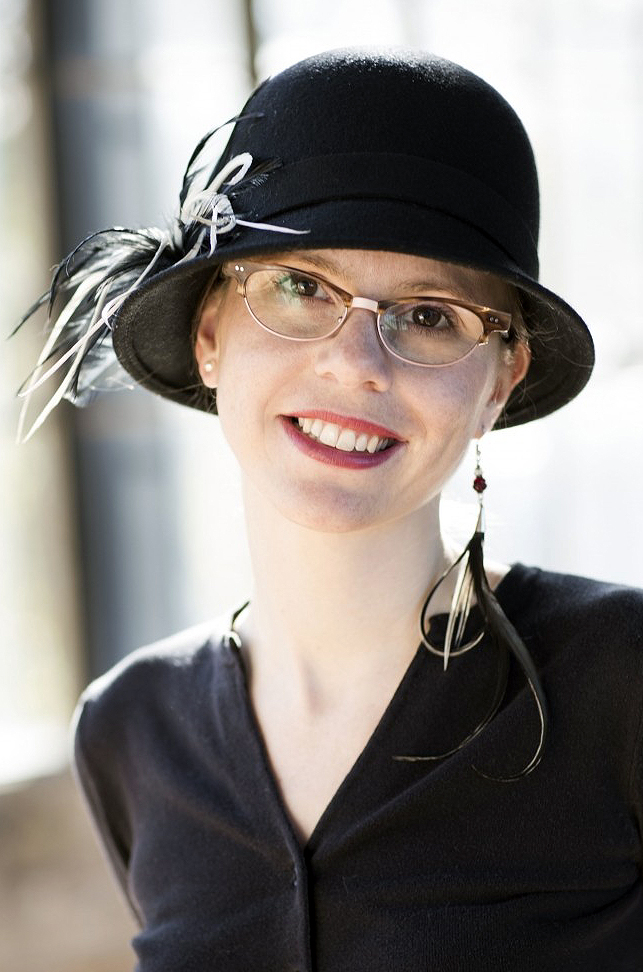
Anna Clyne’s music can be described in a multitude of ways: the most simple and straightforward would be to say her combinations of textures and soundscapes are downright appealing. That’s certainly the case for her Postponeless Creature, a setting of an Emily Dickinson poem, for three female voices, chamber ensemble and tape.
The 12-minute piece is a segment of a work-in-progress, a 75-minute multimedia chamber opera that delves into the imagination of the 19th-century poet known as the Belle of Amherst. Postponeless Creature, which will receive its world premiere March 23 as part of a MusicNOW concert at the Harris Theater, is scored for three flutes, contrabassoon, harp, harpsichord, percussion and string quintet. “I was fortunate to have the option of selecting the instrumentation,” says Clyne, the CSO’s co-composer-in-residence. “I wanted to create a very ethereal and evocative sound world. The decision to have three flutes with three voices was a conscious one, a glue between the voices and the chamber ensemble.”
The piece is 12 minutes long, roughly half the duration of Beethoven’s Fifth Symphony. Of course, the challenge for the composer is how to take eight lines of Dickinson’s poetry and keep the audience engaged for a full 12 minutes. For her inspiration, Clyne simply turned to the poem — a mere 58 words. “Upon first reading, it might seem simplistic, but Dickinson’s words are heavily laden with meaning,” she says.
Much of Dickinson’s work has dark undertones but Postponeless Creature goes well beyond that. The creature, of course, is death, which makes Dickinson’s 58 words incredibly sinister. “Her poem is very eerie, a door to a very dark world. There was no choice but to take the music in that direction,” Clyne says.
The work, which will be performed at the Harris Theater by Cliff Colnot, MusicNOW principal conductor, leading members of the Chicago Symphony Orchestra and Chicago Symphony Chorus, also features pre-recorded material. “It’s very subtle but very valuable — part of the fabric of the music,” Clyne says. “Of course, my vocabulary as a composer includes pre-recorded sounds. It’s almost like another instrument rather than something that is separate.”
Clyne credits her style of creative process to a late start in learning traditional composition. “It wasn’t until my third year of undergrad,” she says. “I took lessons in electro-acoustic composition — taking recorded sounds and manipulating and layering them, as opposed to using electronically generated sound. The two are quite different.
“If I were writing a piece for solo cello, I might record the cello being plucked, bowed and slapped, and with those sounds, layer a pre-recorded tape component, which then can be performed with the live cello so that it brings the two sound worlds together — the recorded and the acoustic. Even if you have only one instrument, the pre-recorded component helps create a much larger, dynamic sound world so that one instrument has a much larger impact.”
Born in London, Clyne grew up outside Oxford. Neither of her parents were professional musicians. Still, the young Clyne taught herself piano, and later took up the cello. She wrote music in her teens but didn’t have formal training until she was 20.
Clyne works first at the piano. “That’s where I come up with all my material and then it gets into a dialogue between the piano and the computer. I’ll enter some of the ideas into the computer to get the pacing of it, and the harmonic and rhythmic structure. I usually start with one idea, and then with time, it usually develops. When I’m in full throttle-composing mode, I dream about it.”
She obviously dreamed a good deal about Postponeless Creature. “In terms of the vocal writing, I very much wanted it to be that the three voices are full of the disembodied Emily Dickinson,” she says. “The three voices sometimes are singing together, sometimes in unison and often in harmony. The writing is very lyrical. I’m not a singer myself but I do sing all the lines to get a sense of how they feel. My parents listened to a lot of old singers — a lot of jazz singers — so melody-driven music is very much an influence on me.
“I draw inspiration from my peers who are not always from the classical tradition. I have a lot of friends who are wonderful jazz musicians, singer-songwriters, and of course, composers. Even when my music is not for the voice, there’s a vocal quality to it.”
That vocal quality is in abundance in Postponeless Creature. Clyne adds, “I’m really looking forward to sharing this with the MusicNOW audience.”
Jack Zimmerman, a recovering trombonist, is a Chicago-based writer and novelist.
TOP: Illustration of Emily Dickinson, artist unknown.
